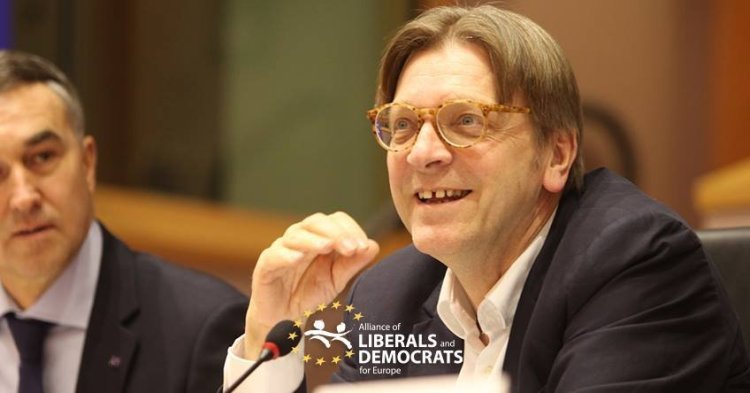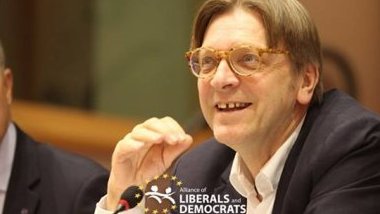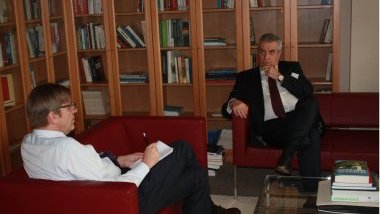Mr Verhofstadt, being a dedicated European is often not easy these days. What makes you personally optimistic about Europe’s future?
The crises of our time cannot be solved by a state on its own; nationalism can’t be the answer. The economic crisis, the refugee crisis, the fight against terrorism − these tasks can only be tackled at a European level. And if we are able to tackle and solve these problems, it would enhance confidence in the European project. People are not against Europe − they are against this form of the European Union.
Following the coup, we saw very worrying developments concerning the rule of law, division of powers and democracy in Turkey. At the same time, the EU made itself dependent on Turkey due to the EU’s inability to properly coordinate a response to the refugee question and find a common asylum policy. How should the EU handle the situation? What action do we need now in terms of refugee plans and the EU-Turkey relations?
What we see now in Turkey is a further crackdown by the AKP party on the freedom of the press, on the independence of the judiciary and on the rule of law. Erdogan’s reaction to the coup has taken his country further down the wrong path. Turkey must get back on the right track. It cannot be a partner in our asylum and migration policy as long as its government abuses the law to trample human rights and civil liberties. The EU cannot entrust its asylum politics to such authoritarian regimes. Instead of giving Erdogan the keys to Europe, we should seek a genuine European solution, with a European border and coast guard to protect our external borders and border guards that make the distinction between real refugees and economic migrants. We need a common asylum policy in Europe with one set of rules for the whole union.
One of our main problems, e.g. in the refugee question, is a lack of European solidarity. The BrExit added to the doubts about the European spirit (although we witnessed rising approval rates for the EU following the referendum). How can we successfully rebuild the trust in the European project in order to fight the unjustified criticism? And what reforms does the EU need to deal with the justified criticism?
What we need is a radical reform to make the EU work again − like a European border and coast guard and a European asylum and migration policy to tackle the migration crisis, a European capacity in intelligence to fight terrorism, a European defence community to protect our borders... If we are able to solve the crisis around us, this will restore confidence. At the same time, we should make Europe more efficient and less bureaucratic: e.g., the Commission could be a small but effective European government. We do not need 28 different ministers; we could be more efficient, focussing on the big issues where European integration has a real added value. We also need a single seat for each of our institutions. We should do more with less.
Another pressing issue we currently face are attacks on democratic, open and tolerant life in Europe. Terrorist attacks aim at destroying the diverse, tolerant and open societies we envision in Europe. At the same time, right wing populism and extremism is on a frightening long-term rise and xenophobia and particularly islamophobia are spreading, thus buying into the narrative of confrontation and a ‘clash of cultures’. How can we build liberal European societies against attacks from terrorists and against attacks from xenophobic and right-wing movements?
Although the extreme right is doing its best to pit people against each other, luckily we saw the opposite: The attacks in Brussels brought people of different religious and cultural backgrounds together. We had silent marches for peace and commemorations all over the city. The message was each time the same: this brutal terrorism will never succeed in dividing our open and tolerant society.
The answer to the fear of terrorism and mass migration should be clear, European solutions for the problems we face. We need to give Europol the means and the powers to act in transnational crimes such as terrorism. The far right is very good at defining the problem, but they offer few solutions. It is simply impossible to close ourselves off from our fellow European countries. We need to work together to stand stronger in the world. Build European capacities to tackle the problems instead of closing ourselves off and hoping that they go away.

Another long term challenge we are facing is that of climate change. The treaty achieved in Paris is called a historic achievement by some, while others criticise it would fail to limit global warming to 2°C. How do you assess the outcome of the COP Conference in Paris, what role should the EU play in combating climate change?
This is a historic agreement that we have broadly welcomed. Our focus must now be on implementation; the clock is ticking to keep global warming under 2 degrees. This climate agreement gives a clear signal that the world has taken an irreversible step towards a low carbon economy. Individuals, governments and businesses must now start implementing the agreement. Mr Verhofstadt, the EU is sometimes referred to as a normative power. Article 3.5 TEU says: “In its relations with the wider world, the Union shall uphold and promote its values and interests and […] contribute to peace, security, […] eradication of poverty and the protection of human rights, […] the strict observance and the development of international law […]”. Is the EU fulfilling this expectation – or what needs to be changed to do so?
We are very far from fulfilling this expectation. We do not even manage to promote these values within Europe. Look at what is happening in Poland and Hungary at the moment. If the EU wants to be able to defend these ‘soft’ values, it will have to do so by building ‘hard’ power: a common foreign policy, a common defence system and a Commission that is able and willing to enforce the rule of law within the Member States. It is time to make this choice in Europe: either we start living up to our promises or we stop making them. Because for the moment it is nothing more than talk.
https://www.youtube.com/watch?v=iqQtDABFfao
We have one last question to give our readers a specific idea of potential action as well as a positive outlook. You’re currently working on a report on the “Possible evolutions and adjustments of the current institutional set up of the European Union” and are the perfect person to be asked: what should be changed in the EU(‘s institutional configuration) to develop and equip it for the future – what is your vision for the EU? And what is Europe’s greatest obstacle right now and how can we overcome it?
The EU often seems to be a bureaucratic giant − Europe has become an expert in making legislation on the exact measures and colours of a pack of cigarettes or on the amount of water toilets flush. Critics are right when they say that the European Union is not working when it comes to the big issues: Eeconomic and monetary cooperation is becoming increasingly tougher, so we have the lowest economic growth rates of all continents. When it comes to European foreign policy, we cannot make a fist, so we have little or no influence on the fires raging around our borders. The UK referendum has shown again that the EU must reform to maintain the support of European citizens.
To make it work again we should clean up the institutional chaos that has been created after decades of compromises that have resulted in a „Europe a la carte“ based on opt-ins, opt-outs and derogations. We should use two kinds of cooperation: Full membership to allow those who want to integrate further to do so and a secondary form of associate membership, or „special status“, which provides membership essentially limited to a single market.
To make the European Commission more effective and less bureaucratic we should turn it into an efficient government of 12 to maximum 15 European ministers. This European government should be controlled by a two-chamber system: the European Parliament and a European Council in which the countries are represented. This new European government should focus on the big issues where European integration has a real benefit, while leaving more detailed regulation to the Member States. The new institutional set up should make the Union more effective on the issues where European citizens see added value of European cooperation such as foreign policy, European defense, the fight against terrorism, European economy. The past decade has shown that Europe is at a standstill. We need to move forward.
Mr Verhofstadt, thank you very much for the interview, it was a pleasure talking to you.




Kommentare verfolgen: |
|
